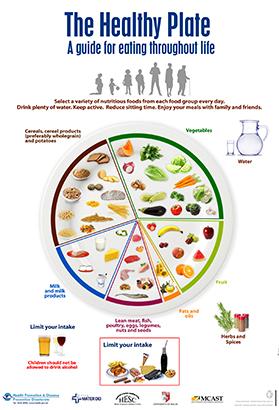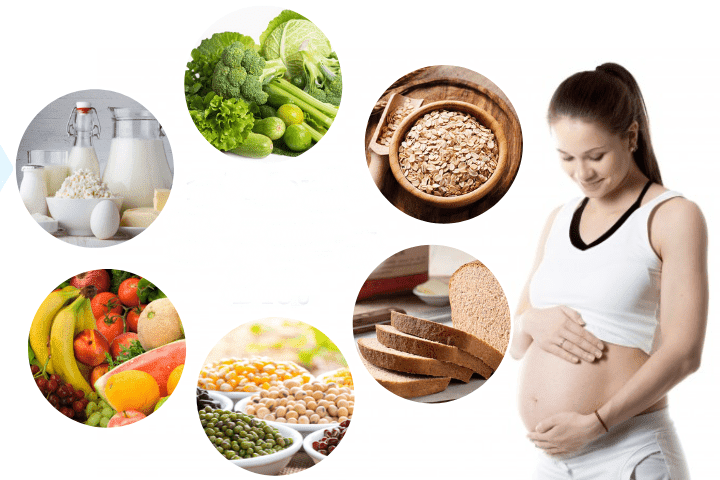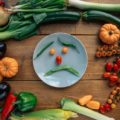
Nutrition during pregnancy is a very vital aspect for a healthy pregnancy or when planning to concieve, as it helps your baby develop well…
Nutrition During Pregnancy: A Balanced Diet
A healthy diet is an important part of a healthy lifestyle at any time but is
especially vital if you’re pregnant or planning a pregnancy. Eating healthily during pregnancy will help your baby to develop and grow well. Unless you suffer from any diet-related conditions, you do not need to go on a special diet, but it’s important to eat a variety of different foods every day to get the right balance of nutrients that you and your baby need.
Folic acid is a supplement that is always taken during pregnancy as well as some other vitamins which may be given accordingly by your doctor. Although you may be hungrier than usual if you’re pregnant, ‘eating for 2’ is a myth and can cause unnecessary weight gain during pregnancy. Eating healthily often means changing the amounts of different foods you eat, so
that your diet is varied, rather than cutting out all your favourites. You can use the Healthy Plate to get the balance of your diet right. It shows you how much of what you eat should come from each food group to achieve a healthy, balanced diet.

You do not need to achieve this balance with every meal, but try to get the balance right over a week.
A healthy breakfast is always important to start off the day. It will help you avoid snacking of high fat or high sugar foods. Eat plenty of fruit and vegetables because these provide vitamins and minerals, as well as fibre, which helps digestion and can help prevent constipation. Eat at least 5 portions of a variety of fruit and vegetables every day – these can include fresh, frozen, canned, dried or juiced. Always wash fresh fruit and vegetables carefully.
Choose lean meat, remove the skin from poultry, and try not to add extra fat or oil when cooking meat. Make sure poultry, burgers, sausages and whole cuts of meat such as lamb, beef and pork are cooked very thoroughly until steaming all the way through. Check that there is no pink meat, and that juices have no pink or red in them. Try to eat 2 portions of fish each week, 1 of which should be oily fish such as salmon, sardines or mackerel. Dairy foods such as milk, cheese and yoghurt are important in pregnancy because they contain calcium and other nutrients that you and your baby need.
High fat and high sugar food in nutrition during pregnancy
Sugary foods and drinks are often high in calories, which can contribute to weight gain. Having sugary foods and drinks can also lead to tooth decay. Fat is very high in calories, so eating too many fatty foods, or eating them too often, can make you put on weight. Eating too much saturated fat can also increase the amount of cholesterol in your blood, which increases your chance of developing heart disease. Foods that have a high sugar and/or fat content and therefore should be limited in your diet include: butter, oil, salad dressings, cream, chocolate, crisps and other snack packets, biscuits, pastries, takeaway food (such as pastizzi, qassatat), ice cream, cake and soft drinks. These foods should be very limited in a diet, taken less often and in small amounts.
There is some food which contains unsaturated food such as oily fish, nuts, avocado and olive oil. These fats can be included in your diet as they provide Omega 3 and Omega 6 which are important for your health. Always be careful of portion size as balance is very important in any diet.
Healthy snacks as part of nutrition during pregnancy
If you get hungry between meals, try not to eat snacks that are high in fat and/or sugar, such as sweets, biscuits, crisps or chocolate. Instead, choose something healthier, such as:
- small sandwiches or pitta bread with cheese, lean ham, tuna, salmon, or
- sardines, with salad
- salad vegetables, such as carrot, celery or cucumber
- low-fat, lower-sugar fruit yoghurt, or plain yoghurt with fruit
- hummus with wholemeal pitta bread or vegetable sticks
- fruit
- vegetable and bean soups
- a small bowl of unsweetened breakfast cereal, or porridge, with milk
- milky drinks
- fresh fruit
- baked beans on toast or a small baked potato
Nutrition during pregnancy – Food Safety

It is very important to be careful when preparing food during pregnancy, as well as avoiding some food due to some chemicals it can contain or its risk of causing food poisoning. Wash fruit, vegetables and salads to remove all traces of soil, which may contain toxoplasma (a parasite that can cause toxoplasmosis) which can harm your unborn baby.
Always wash all surfaces and utensils, and your hands, after preparing raw foods (poultry, meat, eggs, fish, shellfish and raw vegetables) to help you avoid food poisoning. Also make sure that raw foods are stored separately from ready-to-eat foods, otherwise there’s a risk of contamination. Use a separate knife and chopping board for raw meats. Heat ready meals until they’re steaming hot all the way through – this is especially important for meals containing poultry. You also need to make sure that some foods, such as eggs, poultry, burgers, sausages and whole cuts of meat like lamb, beef and pork, are cooked very thoroughly until steaming all the way through. There should be no red areas or blood in the meat once its cooked. Avoid sushi as it contains or comes in contact with raw fish.
There are also some cheeses which need to be avoided during pregnancy.
Unpasteurised dairy products may contain listeria. This bacteria can causes an infection called listeriosis which has a small chance of leading to miscarriage, stillbirth or makes your newborn baby very unwell.
Unpasteurized cheese to be avoided include Brie, Camembert, Chevre, Danish blue, Gorgonzola and Roquefort. Also avoid cheeselets (ġbejniet) unless they are from a reputable company which pasteurizes all its cheeses and says so on the label.
Also be careful of cold cured meats, such as salami, pepperoni, chorizo and prosciutto (unless cooked thoroughly). Always avoid raw or partially cooked eggs, raw or undercooked meat, liver and liver products and all types of pâté, including vegetarian pâté and game meat. There’s a small risk of getting toxoplasmosis if you eat raw and undercooked meat, which can cause miscarriage. Cured meats are not cooked, so they may parasites in them that cause toxoplasmosis. Liver and liver products have lots of vitamin A in them. This can be harmful to an unborn baby.
Game meats may contain lead shot.
Some fish also needs to be avoided. If you’re pregnant, you should not eat more than 2 portions of oily fish a week, such as salmon, trout, mackerel or herring. Oily fish may contain pollutants such as dioxins and polychlorinated biphenyls in them. If you eat too much of these, they can be harmful to your unborn baby.
You should not eat more than 2 tuna steaks (about 140g cooked or 170g raw) or 4 medium-size cans of tuna (about 140g when drained) per week. Tuna contains more mercury than other fish which can be harmful to an unborn baby. There is some fish that needs to be avoided completely including swordfish, marlin, shark and raw shellfish. Raw shellfish should be avoided because they can have harmful bacteria, viruses or toxins in them. These can make you unwell and give you food poisoning.
Caffeine and alcohol
During pregnancy, you can have caffeine, but not more than 200mg per day. You can also drink not more than 4 cups of herbal tea a day.
Here are some caffeine amounts to guide you:
- 100mg in a mug of instant coffee
- 75mg in a mug of tea (green tea can have the same amount of caffeine as regular tea)
- 40mg in a can of cola
- 80mg in a 250ml can of energy drink
- less than 25mg in a 50g bar of plain dark chocolate
- less than 10mg in a 50g bar of plain milk chocolate
Drinking alcohol in pregnancy can lead to long-term harm to your baby. If you’re pregnant or planning to get pregnant, the safest approach is to not drink alcohol at all. This keeps risks to your baby to a minimum.
Additional information
During your pregnancy, you should not take high-dose multivitamin supplements or any supplements with vitamin A in them. If you’re suffering from morning sickness, food aversions or acid reflux, you might not feel like eating much. Be careful to maintain your energy and nutrients by still trying to eat a varied diet through nutrition during pregnancy. Speak to your doctor or to a dietitian if you feel that you are not managing to eat well enough.

Ariana Zarb is a Registered Dietitian, having completed a BSc. (Hons.) in Applied Food and Nutritional Sciences as well as a Postgraduate Diploma in Dietetics. She is currently reading for an MSc in the Professional Practice of Dietetics.
Click here to check out Ariana’s full bio as well as a list of all her Wham published articles





